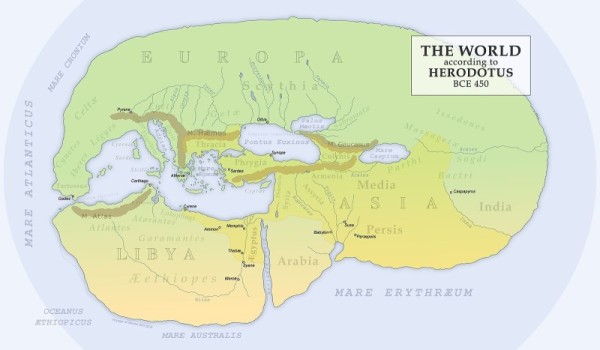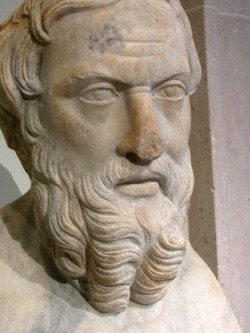The Scythians meanwhile having considered with themselves that they were not able to repel the army of Darius alone by a pitched battle, proceeded to send messengers to those who dwelt near them . . . .

Translated by George C. Macaulay — our special project presenting the complete Herodotus with URLs for all of those people, places, events, and things which baffles and discourages modern readers.
Previously on Herodotus
101. Scythia then being looked upon as a four-sided figure with two of its sides bordered by the sea, has its border lines equal to one another in each direction, that which tends inland and that which runs along by the sea: for from Ister to the Borysthenes is ten days’ journey, and from the Borysthenes to the Maiotian lake ten days’ more; and the distance inland to the Melanchlainoi, who are settled above the Scythians, is a journey of twenty days. Now I have reckoned the day’s journey at two hundred furlongs: and by this reckoning the cross lines of Scythia would be four thousand furlongs in length, and the perpendiculars which tend inland would be the same number of furlongs. Such is the size of this land.
102. The Scythians meanwhile having considered with themselves that they were not able to repel the army of Darius alone by a pitched battle, proceeded to send messengers to those who dwelt near them: and already the kings of these nations had come together and were taking counsel with one another, since so great an army was marching towards them. Now those who had come together were the kings of the Tauroi, Agathyrsians, Neuroi, Androphagoi, Melanchlainoi, Gelonians, Budinoi and Sauromatai.
103. Of these the Tauroi have the following customs:—they sacrifice to the Maiden both ship-wrecked persons and also those Hellenes whom they can capture by putting out to sea against them; and their manner of sacrifice is this:—when they have made the first offering from the victim they strike his head with a club: and some say that they push the body down from the top of the cliff (for it is upon a cliff that the temple is placed) and set the head up on a stake; but others, while agreeing as to the heads, say nevertheless that the body is not pushed down from the top of the cliff, but buried in the earth. This divinity to whom they sacrifice, the Tauroi themselves say is Iphigeneia the daughter of Agamemnon. Whatsoever enemies they have conquered they treat in this fashion:—each man cuts off a head and bears it away to his house; then he impales it on a long stake and sets it up above his house raised to a great height, generally above the chimney; and they say that these are suspended above as guards to preserve the whole house. This people has its living by plunder and war.
104. The Agathyrsians are the most luxurious of men and wear gold ornaments for the most part: also they have promiscuous intercourse with their women, in order that they may be brethren to one another and being all nearly related may not feel envy or malice one against another. In their other customs they have come to resemble the Thracians.
105. The Neuroi practice the Scythian customs: and one generation before the expedition of Darius it so befell them that they were forced to quit their land altogether by reason of serpents: for their land produced serpents in vast numbers, and they fell upon them in still larger numbers from the desert country above their borders; until at last being hard pressed they left their own land and settled among the Budinoi. These men it would seem are wizards; for it is said of them by the Scythians and by the Hellenes who are settled in the Scythian land that once in every year each of the Neuroi becomes a wolf for a few days and then returns again to his original form. For my part I do not believe them when they say this, but they say it nevertheless, and swear it moreover.

CC BY-SA 2.0 image from Wikipedia.
106. The Androphagoi have the most savage manners of all human beings, and they neither acknowledge any rule of right nor observe any customary law. They are nomads and wear clothing like that of the Scythians, but have a language of their own; and alone of all these nations they are man-eaters.
107. The Melanchlainoi wear all of them black clothing, whence also they have their name; and they practice the customs of the Scythians.
108. The Budinoi are a very great and numerous race, and are all very blue-eyed and fair of skin: and in their land is built a city of wood, the name of which is Gelonos, and each side of the wall is thirty furlongs in length and lofty at the same time, all being of wood; and the houses are of wood also and the temples; for there are in it temples of Hellenic gods furnished after Hellenic fashion with sacred images and altars and cells, all of wood; and they keep festivals every other year to Dionysos and celebrate the rites of Bacchus: for the Gelonians are originally Hellenes, and they removed from the trading stations on the coast and settled among the Budinoi; and they use partly the Scythian language and partly the Hellenic. The Budinoi however do not use the same language as the Gelonians, nor is their manner of living the same:
109, for the Budinoi are natives of the soil and a nomad people, and alone of the nations in these parts feed on fir-cones; but the Gelonians are tillers of the ground and feed on corn and have gardens, and resemble them not at all either in appearance or in complexion of skin. However by the Hellenes the Budinoi also are called Gelonians, not being rightly so called. Their land is all thickly overgrown with forests of all kinds of trees, and in the thickest forest there is a large and deep lake, and round it marshy ground and reeds. In this are caught otters and beavers and certainly other wild animals with square-shaped faces. The fur of these is sewn as a fringe round their coats of skin, and the testicles are made use of by them for curing diseases of the womb.
– Herodotus, Book IV
| <—Previous | Master List | Next—> |
Herodotus made his living by being interesting. In a world where most people did not read and could not afford to buy a book even if they could, they would pay to listen to Herodotus recite from his books. They would not pay to be bored. In that world, the names that populate his stories would have some general familiarity to his audience. Their obscurity to us is a barrier that this series seeks to break down.
MORE INFORMATION
MAP LIBRARY
Because of lack of detail in maps as embedded images, we are providing links instead, enabling readers to view them full screen.

126322 525742I actually prize your function , Fantastic post. 609596